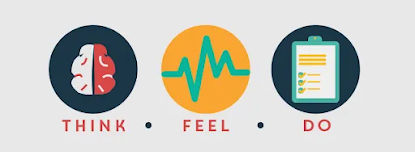Coaching with T.E.A.
Our lives are very much controlled by our thoughts, emotions and actions (or behaviours). It isn’t obvious, but these three elements are integral to who we are. What’s less obvious is how these elements interact. What we think affects how we feel, how we feel affects what we do. There are conflicting thoughts on which of these come first, I guess it depends on which we notice first. To me, what’s more important is, how aware we are of our thoughts, emotions and actions.
I believe our behaviours or actions and decisions are the outward “expressions” of our thoughts and feelings. It is the most obvious of the three elements, it is what others see and experience. What’s less obvious are our thoughts and emotions.
In coaching, this knowledge should help us coaches to guide coachees in exploring and bringing to awareness the thoughts and feelings that are driving them. As coaches, we need to look beyond the surface and dig deeper. We’re often unaware of the impact our thoughts, emotions and behaviours have on each other, and because of this relationship, changing how we think or feel can have a big effect on our behaviour. What we see on the surface are just symptoms. To address the real issue, we need to look beyond the symptoms, we need to start looking within. The following steps could help:
1. Pace – It’s difficult to think rationally or focus when things are intense. Slowing down helps us (and the coachee) stay calm and calming down can help us focus and think better. A common calming technique is deep breathing.
2. Presence – It’s not enough to just slow down, we need to help our coachee to be mindful and be present with their thoughts and emotions. Asking questions like, “What feelings are you experiencing?” and “What are you thinking?”.
3. Process – Try to understand triggers and what causes certain behaviours, emotions and/or thoughts. This could potentially help the coachee make sense of certain situations.
Insights our coachees gain from this can empower them to make positive changes in their lives. When we recognise the impact our thoughts and emotions have on our actions, we gain greater control over our behaviours and choices.




Comments